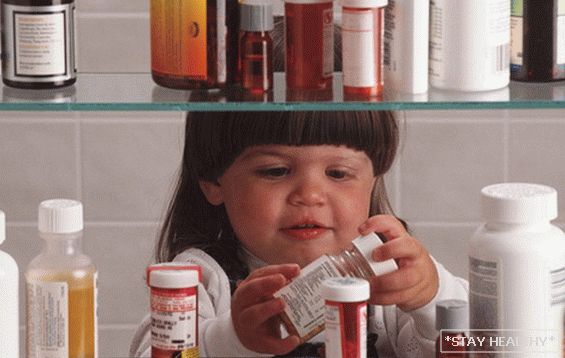 Пт, 06 май 2016 Автор: врач Евгений
Пт, 06 май 2016 Автор: врач ЕвгенийKorunsky
Modern antibiotics are artificial drugs,
made from synthetic compounds whose main task
is the suppression of the activity of certain strains of viruses and
bacteria.
Many parents distrust this group.
medicines, and do not want them to give the child.
Consider in more detail whether it is possible to give children antibiotics, and
everything connected with it.
Contents
When can I give children antibiotics?
Antibiotic therapy can be used to treat
a child only when his illness was caused
bacteria.
Direct indications for prescribing antibiotics
are:
1. Severe forms of acute respiratory infections in children from three to ten years old,
accompanied by fever and fever.
2. Infectious lesions of the upper and lower respiratory tract
(acute purulent sinusitis, tonsillitis, pneumonia, otitis media).
3. Acute urinary tract infections that are accompanied
high temperature in a child (cystitis, pyelonephritis).
4. Meningitis (inflammation of the brain).
5. Encephalitis.
Despite direct testimony to decide, assign a child
antibiotics or not, should the attending physician, based on severity
diseases, symptoms of its course and general condition
baby
It is important to know that the wrong therapy (the drug itself,
dosage, method of administration, etc.) may cause a small
Patient whole set of side effects.
Most often, after taking antibiotics in children develop
such complications:
• diarrhea;
• colitis;
• stomach ache;
• nausea;
• vomiting;
• drowsiness;
• indigestion;
• dysbacteriosis;
• bloating;
• loss of appetite;
• allergic reactions in the form of a rash and itching of the skin;
• disturbance in the nervous system (apathy, sleep disturbance,
nervousness, etc.).
In more severe cases (often happens with the unauthorized appointment
the child of the drug) the baby may develop a violation of the enamel of the teeth,
growth retardation, hearing loss and impaired kidney function.
Can children use antibiotics? Features of data assignment
drugs
When a child is sick, the parents are trying with all their might
to help. Despite this, it is very important not to harm your baby
wishing him the best. This often happens with outpatient treatment.
conditions when the patient is at home. Adults can arbitrarily
begin to treat the child and give him drugs, the effect of which
not enough is known.
In addition, it is important to know that a very large role in the correct
taking antibiotics plays the calculation of the dosage taken
(based on the age and weight of the baby). If treated
a child with an overdose of medication, this can be extremely
negatively displayed on his state of health.
Despite the fact that antibacterial drugs are considered one
of the most powerful, they do not possess such healing
properties:
• do not lower body temperature (for this you need separately
take antipyretic drugs);
• do not relieve pain syndrome (for this purpose,
analgesics);
• does not relieve inflammation (for this purpose, prescribed
anti-inflammatory drugs).
The main objective of these drugs is exactly
elimination of the source of infection – bacteria and microbes. In other cases
taking them is contraindicated.
Also, in no case should antibiotics be given to a baby without
medical appointment, and the reception must be controlled
(best of all, if such therapy will take place under conditions
hospital under medical supervision).
Separately, it is worth mentioning when parents
refuse to give the child an already prescribed drug, justifying
это тем, что лекарство может навредить организму baby
In this case, the doctor has no right to insist, but it is worth
know that prescribing a particular drug, the doctor always weighs
benefit from the drug with the possible risks of taking it. Besides,
without proper indications in the patient’s state the responsible doctor
never prescribe treatment like medicinal
means.
Taking antibiotics has features that are important.
to take into account to protect the child from unwanted
consequences:
1. The selection of the drug should be carried out, given the age
patient (for example, children under 8 years old should not be given
tetracyclines).
2. The drug should be taken orally (by mouth). AT
pediatrics such a method of admission is considered the least painful.
3. It is better to give preference to those antibiotics that
contains a minimum of dyes and sugar (so as not to cause
allergic reactions).
4. It should be exactly the child to give exactly the dose of medication
which was appointed by the doctor – no less and no more.
5. ATажно соблюдать длительность лечения, назначенное доктором.
It is often the case that parents, after a three-day course
treatment themselves cancel their medication because they see improvements in
состоянии baby Despite this, you should complete a full course.
therapy (5-7 days) so that the drug can completely suppress the focus
infections.
6. Do not combine antibiotics with antihistamines
drugs (this can cause adverse reactions).
7. If a baby has allergies or other negative
symptoms during treatment, you need to tell your doctor. With
If necessary, he will cancel the medication and replace it with similar ones.
therapeutic effect analogue.
8. Categorically you can not give the child antibiotics, the term
whose actions have already expired (they may be toxic).
Can children use all antibiotics?
The children’s body is not yet strong enough to affect some
групп drugs, поэтому далеко не все виды антибиотиков можно
assign child.
The most dangerous for children are considered such
antibiotics:
1. Aminoglycoisides (Kanamycin, Gentamicin). With их инъекционном
Children under eight years old may cause deafness. Also, with their
prolonged use of the child can disrupt the work of the kidneys and
urinary system. The maximum course of treatment with such drugs
should be no more than four to five days.
2. Tetracyclines. They are dangerous because they can slow growth and
increase blood pressure. Also, with their длительном приеме у
Tooth enamel can be thinned. Assign them to children under three
years is absolutely contraindicated.
3. Levomycetin can cause disturbances in the work of the central
nervous system.
4. Ceftriaxone can cause dysbacteriosis in a patient. To his children
It is not recommended to appoint at any age.
Children can be given antibiotics, and sometimes even vital.
necessary, because sometimes they can save the life of the little
man






